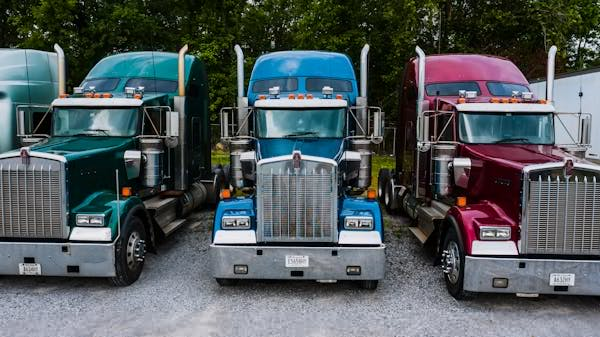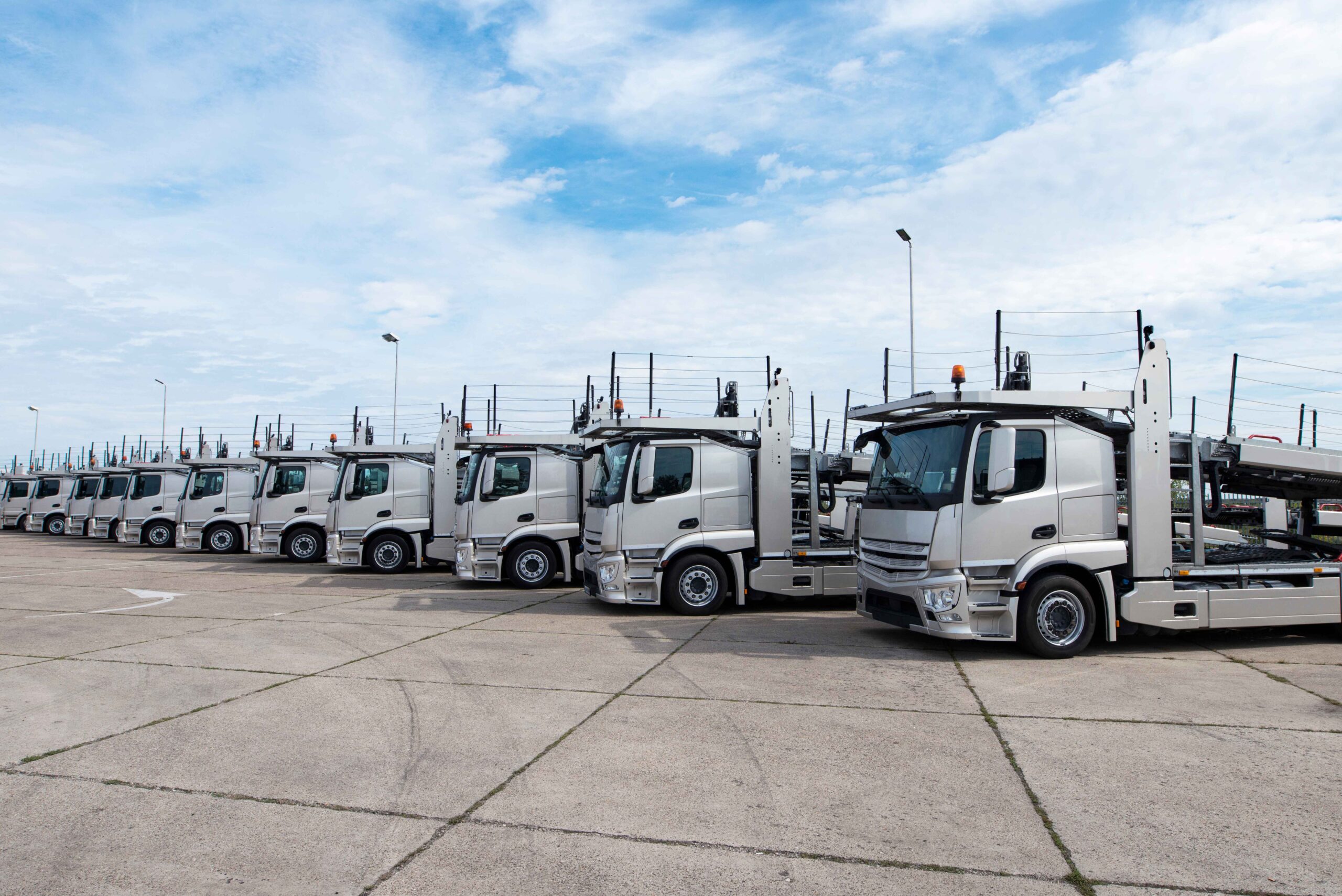Major Trucking Industry Problems and How You Can Overcome Them
Trucking is the backbone of the global economy, with goods being transported across vast distances every day.
In the United States, trucks are responsible for moving approximately 60.1% of the nation’s freight by weight, totaling about 11.7 billion tons annually.
Yet, the industry is facing a set of unique and pressing challenges that can have wide-ranging impacts on its efficiency and profitability.
Among the most significant trucking industry problems today are the ongoing driver shortages, fluctuating fuel prices, and mounting regulatory pressures.
With fewer drivers available, it becomes increasingly difficult to keep up with the demand for freight transportation, leading to delayed deliveries and higher costs.
On top of this, fuel prices are notoriously volatile, putting extra strain on trucking businesses trying to maintain profitability while keeping operations running smoothly.
The trucking industry is also grappling with more stringent regulations, which can be complex and challenging to navigate.
Regulations surrounding hours of service, emissions standards, and safety requirements are constantly evolving, forcing companies to adjust their operations regularly.
These pressures make it more difficult for small and mid-sized trucking businesses to thrive in a highly competitive environment.
The goal of this blog is to explore the major challenges that the trucking industry is facing today, focusing on issues such as driver retention in trucking, fleet management, and fuel price fluctuations.
By the end of this blog, you should know precisely the type of challenges you might face in the trucking business. We’ve also shared how you can successfully mitigate these challenges and run a successful trucking business.
The Growing Driver Shortage: Why Retention Matters

The trucking industry is facing a critical shortage of qualified drivers, and this issue is rapidly becoming one of the most significant trucking industry problems.
As demand for freight transportation continues to rise, there simply aren’t enough drivers to meet that demand.
This shortage has been exacerbated by an aging workforce, with many experienced drivers retiring and fewer younger individuals entering the profession.
The shortage of drivers doesn’t just affect the ability to deliver goods on time, but it also puts a strain on the stability of trucking businesses.
Driver retention in trucking has never been more important. When companies face high turnover rates, they incur additional costs for recruiting, training, and onboarding new drivers.
This constant cycle of turnover can create operational inefficiencies, negatively impact customer satisfaction, and harm a company’s reputation.
Retention is key to maintaining a steady workforce and operational stability.
Companies that focus on keeping their drivers satisfied have a better chance of ensuring a reliable and experienced team.
Offering improved compensation, better benefits and safer working conditions can significantly reduce turnover rates. Drivers who feel valued are more likely to stay, helping businesses maintain consistency and productivity.
Solutions to the driver shortage include investing in programs that support driver training and providing incentives that make the job more appealing.
Many trucking companies are also exploring ways to make the job more family-friendly, offering flexible schedules or regional routes to reduce time away from home.
Another potential solution lies in leveraging technology for more efficient truck fleet management, ensuring that drivers are equipped with the best tools to perform their jobs safely and effectively.
By addressing the driver shortage and prioritizing driver retention, trucking businesses can stabilize their operations and ensure long-term success.
The industry must take proactive steps to make the profession more attractive to both current and future drivers.

Fuel Price Volatility: Navigating the Highs and Lows
Fuel price fluctuations are another one of the most pressing trucking industry problems faced by businesses today.
The volatility of fuel prices can make it difficult for trucking companies to predict their operating costs, which in turn impacts profitability.
As fuel prices rise unexpectedly, transportation costs increase, squeezing margins and putting financial pressure on companies.
This unpredictability makes long-term planning and budgeting a challenge for operators across the industry.
The effect of fuel price volatility extends beyond just the bottom line.
Fluctuating fuel prices can also impact operational efficiency, as businesses may need to adjust their pricing models or absorb additional costs to remain competitive.
Moreover, the pressure of constantly adapting to fuel price changes can lead to trucking safety concerns.
Drivers may be tempted to speed up or reduce rest time to save fuel, ultimately compromising safety.
To better manage these fuel price fluctuations, trucking companies can focus on strategies that help reduce their fuel consumption.
Adopting fuel-efficient trucks, such as those with advanced aerodynamics or hybrid systems, can help lower overall fuel costs.
Moreover, optimizing routes to reduce unnecessary idling or driving in heavy traffic can also contribute to significant savings.
By integrating GPS and route-planning technologies, trucking businesses can ensure drivers are taking the most efficient paths, further reducing fuel consumption and improving overall fuel efficiency in trucking.
Additionally, many companies are adopting fuel surcharges or adjusting pricing based on fuel costs, helping them maintain financial stability despite unpredictable fuel prices.
Implementing such strategies ensures that trucking businesses can remain competitive, minimize risk, and stay profitable even in the face of fuel price fluctuations.
Fleet Maintenance and Aging Trucks: An Ongoing Challenge
Fleet maintenance is another one of the critical trucking industry problems that many businesses face, particularly when dealing with aging truck fleets.
As trucks get older, the likelihood of mechanical failures and the need for repairs increases. This leads to higher maintenance costs and can cause significant operational inefficiencies.
Aging trucks are more prone to breakdowns, leading to unplanned downtime and delays.
These disruptions not only affect delivery schedules but also hurt the company’s reputation and customer satisfaction.
Maintaining an older fleet may seem cost-effective in the short term, but it can become more expensive over time.
Older trucks are less fuel-efficient, and the cost of repairs can outweigh the savings gained from keeping them on the road.
As fuel prices fluctuate, operating aging trucks becomes increasingly inefficient, putting additional strain on the bottom line.
Therefore, modernizing the fleet can bring long-term savings and operational benefits.
Newer trucks are designed to be more fuel-efficient, reducing overall fuel consumption and operating costs.
Additionally, they tend to have better technology, improving reliability and reducing the likelihood of costly breakdowns.
An effective truck fleet management strategy is essential to ensure operational efficiency. One key approach is to establish regular maintenance schedules to ensure all vehicles are running optimally.
Preventive maintenance, such as timely oil changes, tire rotations, and brake inspections, can prevent major issues before they arise. Another important tip is proactive truck replacement. Setting a predetermined schedule for replacing older trucks can help avoid the unexpected costs and disruptions caused by an aging fleet.
By investing in modern trucks and sticking to a strict fleet management plan, trucking businesses can improve reliability, lower maintenance costs, and ensure their fleets remain efficient and competitive.

Road Infrastructure and Its Impact on Trucking Efficiency
Other significant trucking industry problems that businesses face today is the poor and outdated road infrastructure.
Inefficient or damaged roads can greatly hinder the efficiency of trucking operations.
From delays caused by road closures to longer travel times due to potholes and inadequate highways, the state of infrastructure directly impacts delivery schedules and overall business profitability.
Trucks not only spend more time on the road but also face increased wear and tear, which adds to maintenance costs and potential safety risks.
The importance of roads in the trucking industry cannot be overstated.
Timely deliveries depend on smooth and accessible routes, while poor infrastructure can lead to significant delays and missed deadlines.
Additionally, constant exposure to rough roads can cause damage to trucks, including tires, suspension systems, and engines, ultimately leading to higher maintenance costs.
This also contributes to trucking safety concerns, as unsafe roads increase the likelihood of accidents and breakdowns.
To address these challenges, businesses can take proactive steps. One solution is to lobby for infrastructure improvements at local, state, and national levels.
Advocating for better roads can ensure that trucking companies benefit from safer, more efficient routes. Another effective approach is using technology to improve route planning.
GPS tracking systems and route optimization software can help identify the best routes, avoid traffic congestion, and reduce travel time.
By adopting such technology, trucking businesses can minimize the impact of road infrastructure issues and ensure smoother operations.
Overregulation and Compliance: A Burden on Trucking Operations

Navigating complex regulations and meeting compliance standards drains time and resources for trucking businesses. These challenges often lead to operational delays, increased costs, and missed opportunities.
The Impact of Excessive Regulations on Trucking Companies
One of the major trucking industry problems that companies face today is overregulation.
While regulations are essential for ensuring safety and environmental standards, excessive or overly complex regulations can create significant operational challenges.
From restrictions on driver hours to stringent emissions standards, the trucking industry must navigate a maze of rules that can hinder operational flexibility and profitability.
Challenges with Compliance
Trucking compliance challenges often stem from the difficulty of meeting regulations while maintaining smooth operations.
For instance, strict regulations around driver hours limit the time drivers can spend on the road, affecting delivery schedules and increasing costs.
Similarly, emissions standards can require costly upgrades or vehicle replacements, especially for older fleets.
Safety regulations, while crucial, may require additional training and operational adjustments, which can slow down productivity.
How to Stay Compliant Without Disrupting Operations
To minimize operational disruptions while staying compliant, trucking companies can adopt a proactive approach to regulatory compliance.
Staying up-to-date on changing regulations is key, as is implementing effective training programs to ensure drivers and staff understand new requirements.
Investing in fleet upgrades or retrofits to meet emissions standards can help reduce long-term costs.
Additionally, embracing technology such as electronic logging devices (ELDs) can streamline compliance with driver-hour regulations and reduce the risk of penalties.
By taking these steps, trucking companies can better manage the impact of overregulation, reducing the burden on operations while remaining compliant with industry standards.
Unpredictable Supply Chain Disruptions: The Ripple Effect
Unforeseen supply chain disruptions can cause cascading effects throughout trucking operations. Delays, increased costs, and strained customer relationships are just a few of the challenges they bring.
How Supply Chain Inefficiencies Affect Costs and Delivery Times
When supply chain disruptions occur, trucking businesses experience not only delays but also increased operational costs.
Inefficiencies in the supply chain often lead to longer transit times, which means that trucks may be on the road longer, increasing fuel consumption and operational expenses.
Additionally, delays in loading and unloading can result in missed deadlines and lower customer satisfaction.
These issues ultimately affect the bottom line, making it essential for trucking companies to find ways to minimize the impact of supply chain disruptions.
Strategies for Managing Supply Chain Challenges
To mitigate the effects of unpredictable supply chain disruptions, trucking businesses can adopt a range of strategies.
Building stronger relationships with suppliers and partners can help create more resilient supply chains, ensuring that potential disruptions are addressed proactively.
Real-time tracking systems are another essential tool for enhancing visibility and allowing businesses to respond quickly to any issues. Finally, having well-defined backup plans for different types of disruptions can help reduce downtime and ensure that operations continue smoothly, even when the supply chain faces challenges.
By adopting these strategies, trucking companies can minimize the effects of supply chain disruptions and keep their operations running efficiently.
Cost of Trucking Insurance: Rising Premiums and Solutions
One of the pressing trucking industry problems faced by many companies today is the rising cost of trucking insurance.
Premiums have been steadily increasing due to several factors, including higher accident rates, the cost of vehicle repairs, and weather-related damage.
As the cost of repairs and legal liabilities grows, insurance companies adjust premiums to offset these risks.
Additionally, the increasing number of claims and the rising price of medical treatments and legal settlements also contribute to the surge in insurance rates.
The Role of Insurance in Managing Risk
Insurance plays a crucial role in protecting trucking companies against a wide range of risks, including accidents, weather-related issues, and theft.
It provides financial protection for both the business and the driver, covering potential liabilities that could otherwise be financially devastating.
Given the unpredictable nature of the trucking industry, including long hours and challenging road conditions, having the right insurance coverage is essential to safeguard operations and assets.
Solutions for Reducing Trucking Insurance Costs
Despite rising premiums, there are several ways trucking businesses can reduce their insurance costs. One of the most effective strategies is improving safety records.
Companies that prioritize safety, provide proper training for drivers, and implement strict safety protocols are less likely to experience accidents, which can lead to lower premiums.
Additionally, using telematics and tracking systems helps improve route efficiency and monitor driving habits, which can also lower insurance costs by demonstrating responsible driving behavior.
Another solution is selecting the right coverage based on the specific needs of the fleet, ensuring that businesses are not overpaying for unnecessary coverage.
By implementing these strategies, trucking companies can manage the rising cost of trucking insurance while maintaining robust protection for their operations.
Innovative Solutions: Adapting to the Changing Landscape
The trucking industry is experiencing rapid changes, driven largely by technological advancements and the need for more sustainable practices.
Technological integration in trucking has the potential to address many of the challenges faced by the industry, from driver shortages to operational inefficiencies.
The adoption of innovative technologies such as modern trucks, efficient technology for route optimization, and telematics for fleet management can significantly improve efficiency and reduce costs.
These technologies allow for better route planning, real-time tracking, and more effective management of both vehicles and drivers, which ultimately leads to a smoother operation.
Sustainable trucking practices are becoming increasingly important as environmental concerns grow.
From adopting eco-friendly fuels to improving fuel efficiency through modern vehicle designs, sustainability is no longer just a trend—it’s a necessity.
Trucking companies that embrace these practices not only contribute to reducing the environmental impact of their operations but can also benefit from long-term cost savings.
By investing in energy-efficient vehicles and optimizing fuel consumption, companies can reduce their overall cost of trucking operations, making it a win-win situation for both the environment and their bottom line.
As the trucking industry evolves, these innovations and sustainable practices will be key drivers of success.
Companies that embrace these changes will be better equipped to navigate the challenges of the future, ensuring continued growth and efficiency in a highly competitive landscape.
How 24/7 Truckin Can Help You Navigate These Challenges
The trucking industry is facing significant challenges, from driver shortages to unpredictable fuel price fluctuations and fleet maintenance issues. These obstacles can make it difficult for trucking companies to maintain efficient operations, meet deadlines, and stay profitable.
However, understanding and addressing these challenges is key to navigating the complexities of the industry. We’ve taken a step towards our goal of mitigating trucking industry challenges by creating an all-in-one platform – 24/7 Truckin.
Our platform streamlines logistics, enhances productivity, and simplifies fleet management for brokers, owner operators, and drivers alike. For instance, 24/7 Truckin offers real-time tracking and optimized route planning to reduce fuel costs and improve operational efficiency.
We also allow owner operators and brokers to exchange documents without getting off the platform – this makes it easier for everyone to book and assign loads.
Sounds interesting? How about you take a free demo of 24/7 Truckin.
